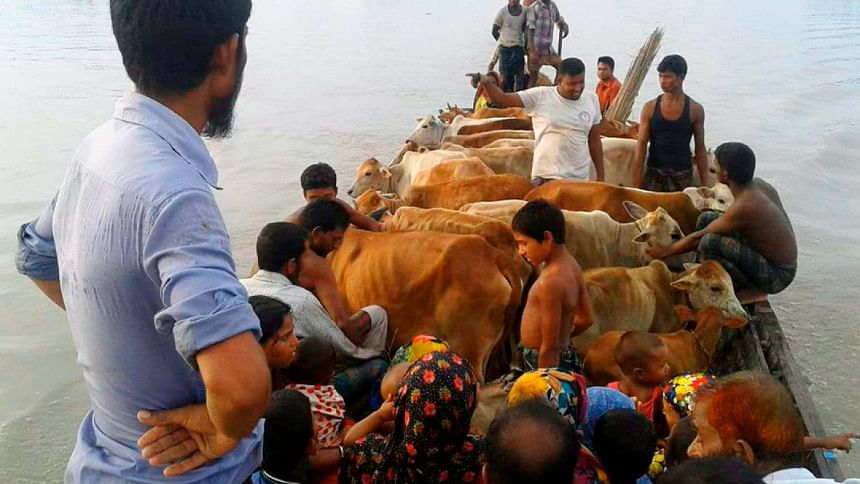Preparing for the next disaster

Floods, cyclones, tidal surges, landslides and other natural disasters have always happened in Bangladesh during predictable times of the year, and in regions we already know are vulnerable. The intensity and frequency of disasters might vary, but we know for a fact that they will happen.
Given this certainty, disasters need not result in enormous suffering and loss of life every year if only we prepare to face them in advance.
Despite the work of many government and non-governmental institutions all over the country, we have not been able to strengthen our preparedness. We need to develop a mechanism whereby these institutions and the community themselves can prepare better for disasters.
The first need during a flood is to rescue people from their submerged habitats. Some communities live in extremely remote places such as chars in the middle of the river, and it is hard to locate them during a disaster. It is crucial to survey and map these areas beforehand and to identify potential shelters, such as embankments, schools and plinths (raised, flood-resistant areas). In order to know where children, the pregnant and elderly are in any village, we must be in contact with people from within the community who have this information.
To rescue people and their property, you need boats. It is not plausible to suddenly find a huge number of boats during a disaster. So the local administration may want to ensure that a boat is assigned to evacuate each village or char during a crisis. During normal times, these same boats can go about their regular work. Additionally, having predetermined shelters in raised areas in or near each community will prevent confusion during crises.
Every year, floods are accompanied with catastrophic and unnecessary suffering due to the outbreak of diseases. Within minutes of arriving at shelters, people need safe drinking water. Usually, there are no tube wells, so people are forced to drink whatever water they can find—which may be contaminated, particularly because there are often no latrines either.
It would be wrong to think that just about anyone can suddenly jump in and start rescuing people. Volunteers could be trained with first aid and rescue techniques such as assisting or moving the injured and elderly people. Another useful skill is tube well maintenance. After a flood recedes, tube wells that had been inundated can be used again after basic maintenance and sanitisation.
During disasters, basic services become unavailable. Whereas a boat might normally cost Tk 5-10 per person, boatmen demand as much as Tk 100-200 per person during floods and Tk 500 per cow which would otherwise cost Tk 30-50.
Without mobility, people cannot access markets, or return to see the condition of their homes or, in case of erosion, find an alternative place to move them. If we give people mobility, that enables them to get back on their feet. Free shuttle boats are a kind of relief.
Moreover, markets collapse and necessary supplies become unavailable during crises. The government and NGOs should consider encouraging and facilitating mobile markets so that supplies and commerce can be maintained.
Clinics and hospitals are often inundated, closed or otherwise inaccessible during floods. One possible solution to this is the mobile clinic—a team of doctors or paramedics and nurses along with medical supplies and basic equipment moving around on a boat.
Many people lose their sources of income during floods because their crop fields are destroyed or eroded, or because their livestock are washed away. Interest free loans could help people recover their livelihoods so that they can get back on their feet. It would also be useful to try to connect people to government services that they are entitled to, but might not know how to access, such as social safety net and special programmes.
Homes and property lost during a flood can eventually be recovered. But lost education cannot. Most schools in the chars have been closed during floods and many have been washed away. Children have lost their books in the water. We need to make sure that damaged books are replaced and schools rebuilt immediately after the flood to minimise the time children spend away from schools. An emergency contingency fund may help speed up this process.
People affected by disaster at times suffer from severe trauma and we need to help them bring back their confidence.
The attitude and behaviour of community workers affect people psychologically. Aid workers should inspire and comfort people. Moreover, we should be respectful to peoples' dignity, dreams and aspirations.
Certain NGOs have been working hard to provide relief to flood affected people in their areas of operation, however, if the government and other agencies come forward and build on these ideas together, that would surely be our best chance of mitigating the next crisis.
Kazi Amdadul Hoque is the Director for Strategic Planning and Head of Disaster Management at Friendship NGO, and has over 22 years of experience in public health and community development.





Comments